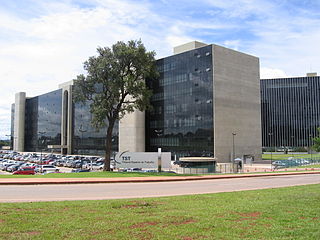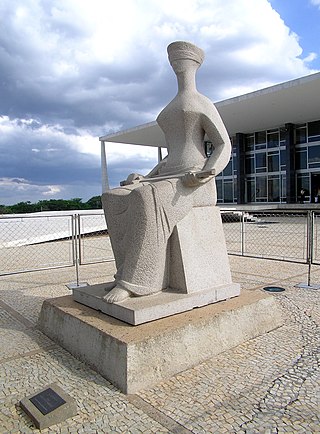Same-sex marriage has been legal in Brazil since 16 May 2013 in accordance with a decision from the National Justice Council, ordering notaries of every state to license and perform same-sex marriages. Brazil became the second country in South America to legalize same-sex marriage nationwide, after Argentina, and the twelfth worldwide to do so.

Lesbian, gay, bisexual, and transgender (LGBT) rights in Brazil rank among the highest in the world. Same-sex couples in Brazil have enjoyed the same rights guaranteed to heterosexual ones since 16 May 2013, including marriage and adoption. On June 13, 2019, the Brazilian Supreme Court ruled that discrimination on the basis of sexual orientation and gender identity is a crime akin to racism.

The Superior Electoral Court is the highest body of the Brazilian Electoral Justice, which also comprises one Regional Electoral Court in each of the 26 states and the Federal District of the country, as determined by the Article 118 of the Constitution of Brazil.
Regional Electoral Court is the judicial body that is in charge of elections at the state level in Brazil. There are 27 TREs, one for each Brazilian state, plus one for the Federal District.

The Federal University of Bahia is a public university located mainly in the city of Salvador. It is the largest university in the state of Bahia and one of Brazil's most prestigious educational institutions.

The Superior Court of Justice is the highest appellate court in Brazil for non-constitutional issues regarding federal law. The STJ also has original jurisdiction over some cases. Its jurisdiction is provided for in Article 105 of the Brazilian Constitution.

The Regional Federal Courts are the courts of appeal in the Federal Courts of Brazil, the second instance courts of the Brazilian federal justice system, responsible not only for appeals of trial court decisions, but also for writs of security, habeas corpus, and habeas data against acts by federal judges, motions to set aside judgments, criminal revisions, and conflicts of jurisdiction.
The federal court system of Brazil has all its organs and competences listed and defined in the Brazilian 1988 Constitution. The National Justice Council is an exclusively administrative organ of the federal court system.

The National Council of Justice (CNJ) is an administrative and oversight organ of the Brazilian Judiciary created by constitutional amendment in 2004 as a part of judicial reform. Among its responsibilities are ensuring that the judicial system remains autonomous, conducting disciplinary proceedings against members of the Judiciary, and compiling and publishing statistics on the Brazilian court system. The Council has nationwide jurisdiction over all courts except the Supreme Federal Court, but makes no rulings on cases and does not review judgements of other courts. Its fifteen members are chosen by the Supreme Federal Court for two-year terms.
Regional Labor Courts are Brazilian appellate courts of the Federal specialized court system for matters of labor law. There currently are 24 Regional Labor Courts, geographically defined by numbered Regions.

The Superior Labor Court, is the highest Brazilian appellate court for labor law issues. Its headquarters are located in Brasilia, near the American Embassy.
The Eloá Pimentel hostage crisis, as it is known, refers to the October 2008 incident involving 15-year-old Brazilian girl Eloá Cristina Pimentel, who was kidnapped, taken against her will and held hostage before being murdered by her 22-year-old ex-boyfriend, Lindemberg Alves. Additionally, Pimentel's friend, Nayara da Silva, was shot by Alves.

Daniel Valente Dantas is a Brazilian entrepreneur. He is known as the founder of the Opportunity Asset Management.

The Judiciary of Brazil is the group of public entities designated by the Brazilian constitution to carry out the country's judicial functions.
Transgender rights in Brazil include the right to change one's legal name and sex without the need of surgery or professional evaluation, and the right to sex reassignment surgery provided by Brazil's public health service, the Sistema Único de Saúde.

Lesbian, gay, bisexual and transgender rights in the Brazilian state of São Paulo are liberal. Same-sex marriage is legally performed in the state, as in Brazil as a whole.

Events from the year 2012 in Brazil.

Luislinda Dias de Valois Santos is a Brazilian jurist, magistrate and politician. Former member of the Brazilian Social Democracy Party (PSDB), was minister of Human Rights. She was the third black judge to be appointed in her home-state (Bahia), was desembargadora of the Court of Justice of the State of Bahia (TJ-BA). She left the office of Minister on 19 February 2018.

Rosa Maria Pires Weber is a Brazilian magistrate, former justice and former president of the Supreme Federal Court, former president of the Superior Electoral Court and former justice of the Superior Labor Court.

The Luciana Tamburini case refers to the episode in which the traffic officer Luciana Silva Tamburini was convicted of contempt of court for stating that the judge João Carlos de Souza Correa was a judge but not God, when approaching him at a traffic blitz of the "Lei Seca" operation on February 12, 2011.














